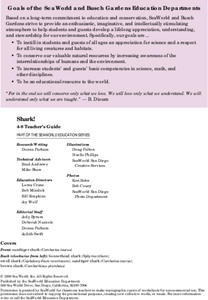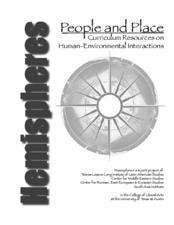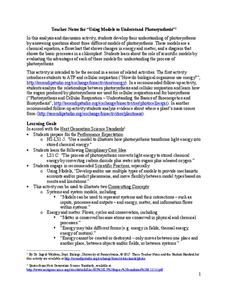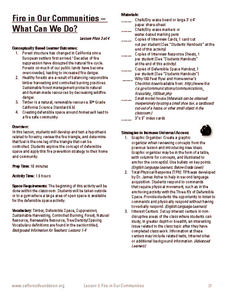American Forest Foundation
Who Speaks for the Trees?
Help young conservationists appreciate the important role that trees play in ecosystems around the world with this collection of six engaging activities. From a shared reading and class discussion of Dr. Seuss' The Lorax, to in an depth...
SeaWorld
Shark!
Here is an impressive collection of lessons on sharks. In them, pupils undertake a serious study of sharks, their habitats, their social structure, and how humans adversely impact their existence. These lessons effectively integrate...
Curated OER
Hemispheres: People and Place
Here is an astounding series of lessons, designed for high schoolers, on environmental policy. By studying water conservation in rural India, the role of the government, and the reaction of the people, learners begin to formulate...
British Council
A New Logo for the World Wildlife Fund
Where does the money go? Learners take a look at the logo for the World Wildlife Fund and discuss characteristics of the panda in the logo. Scholars learn that cute, fuzzy endangered animals often receive the most donations. They keep...
NOAA
Sustaining Our Ocean Resources
Lead young scientists on an investigation of fishery practices with the final installment of this four-part unit. Using a PowerPoint presentation and hands-on simulation, this activity engages children in learning how fish populations...
San Francisco Public Utilities Commission
Water from the Well
How much water does it take to brush your teeth? How about to wash your clothes? Perform an experiment that measures water usage in everyday tasks and compares them to the days before indoor plumbing, specifically the California gold...
University of Waikato
Water Issues
Water may be everywhere but it is not always drinkable. Pupils research water issues, first in a local setting and then with Papua New Guinea and Australia to get a larger world perspective. Teams use the Internet and other resources to...
National Wildlife Federation
Understanding and Measuring School Electronics
Feel the power in turning off electronics. Using energy-monitoring devices, pupils find the amount of energy it takes to power a simple electronic when it is on and when it is off. They then calculate the cost for the entire year for the...
Baylor College
How Can We Find Out What Is in Water?
Using paper chromatography, water watchers discover that several substances might be dissolved even though they aren't visible. For this case, you will prepare a mixture of three different food colorings for them to experiment with. A...
Texas State Energy Conservation Office
Investigation: Oil Recovery
Energy conservers investigate gravel size to discover if it impacts the amount of oil recovered in the extraction process.
Kenan Fellows
Sustainability: Learning for a Lifetime – Soil
Do great gardeners really have green thumbs—or just really great soil? Environmental scholars discover what makes Earth's soil and soil quality so important through research and experimentation. Learners also develop an understanding of...
University of Georgia
Stoichiometry of S'mores
How fun would it be to teach the concept of stoichiometry while allowing your chemistry class to assemble a classic campfire treat? This fun and engaging activity allows pupils to explore the principles of the chemical theory while...
National Wildlife Federation
Master P in the House: An All School Energy and Climate Change Plan
A person in the US uses 20 times more energy than a person in India—that's a drastic difference! The final lesson in the 12-part series goes back to the initial energy audits, analyzes which room showed the most conservation of energy,...
National Academy of Sciences
Lights at Night Webquest
Help learners find ways to become more efficient energy consumers. To start, individuals research how different countries address energy efficiency and then analyze their own carbon footprint. They use their research to identify ways to...
Curated OER
They're Tilling that Field Behind the Mall
Unfortunately, the article for which this resource was written is not available. You can, however, find another current document on agriculture and urban development for your class to read together, and then still follow the suggested...
It's About Time
Exploring Energy Resource Concepts
Please turn off the lights to conserve energy. Or not, after all energy is always conserved. This first lesson in an eight-part series includes three parts. Part A contains one hands-on activity and two inquiry-based experiments on heat...
Serendip
Using Models to Understand Photosynthesis
Is your class in the dark about photosynthesis? Shed some sunlight on an important biological process with a thoughtful activity. After answering questions to help determine their level of knowledge, learners work with chemical equations...
Forest Foundation
Fire in Our Communities - What Can We Do?
Learn about defensible space and renewable resources with a lesson about forest fires. After exploring the ways that humans have impacted the environment, kids conduct mock interviews about differing points of view in the conservation...
Sea World
Endangered Species
Study different endangered species with several activities that incorporate math, science, language arts, and research strategies. A great addition to your instructional activity on conservation or Earth Day.
Department for Children, Schools and Families
Explaining Change Processes Using a Simple Particle Model of Matter
The more things change, the more they stay the same. This unit includes seven lessons starting with physical change and moving through to chemical change. Conservation of matter is explained clearly with multiple hands-on activities and...
It's About Time
The Fossil Record
What do you call a plated dinosaur when he is asleep? A stego-snorus! Through four hands-on activities, young paleontologists rotate through stattions to learn about preservation in rock, resin, ice, and conservation of animal tracks....
Nature Works Everywhere
Sharks and Shorelines
Examine predator-prey marine relationships through an interactive lesson design. Learners begin by studying a specific shark species and then analyze real-time shark-tracking data. They also study threats to shark populations and...
Colorado State University
Why Are Compact Fluorescent Bulbs More Efficient?
Compact fluorescent bulbs are the easiest way to increase energy efficiency around the house. But why? Science scholars compare CF bulbs with their incandescent counterparts using a simple test. A solar-powered toy illuminates the...
Theodore Roosevelt Association
Interpreting the Past; Assessing Its Impact on the Present
Even though the presidency of Theodore Roosevelt ended over 100 years ago, we can still learn something from his stances and policies that is applicable today. Class members first look over a list of prevalent political issues from the...
Other popular searches
- Wildlife Conservation
- Water Conservation
- Marine Conservation
- Conservation Issues
- Conservation of Mass
- Conservation of Energy
- Conservation of Matter
- Energy Conservation
- Conservation of Momentum
- Law of Conservation of Energy
- Soil Conservation
- Law of Conservation of Mass

























